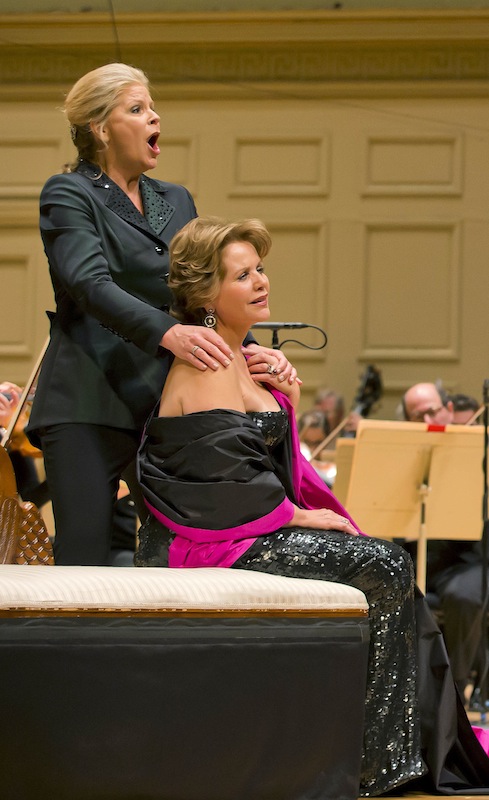A starry cast soars in Boston Symphony’s “Rosenkavalier”

Renée Fleming and Susan Graham sing in Richard Strauss’s “Der Rosenkavalier” with Andris Nelsons and the Boston Symphony Orchestra Thursday night at Symphony Hall. Photo: Winslow Townson
Boston audiences have recently enjoyed a fair share of wide-ranging opera performances. This month alone has offered new and enticing works by ArtsEmerson and Guerilla Opera. Boston Lyric Opera opened its season with Bizet’s Carmen and Odyssey Opera presented Dvořák’s rarely staged Dimitrij in concert form.
But the biggest operatic event in the city took place Thursday night at Symphony Hall, where Andris Nelsons led the Boston Symphony Orchestra and a starry lineup of soloists in a riveting concert performance of Richard Strauss’ Der Rosenkavalier.
The biggest draw was the principal cast, three of which singers have come to define the opera’s leading roles over the past two decades. Renée Fleming first sang the role of the Marschallin at the Metropolitan Opera in 2000 to wide acclaim. Her partner at the time was Susan Graham, who had been singing the role of Octavian at the same venue since 1995. Reunion of the two singers in these roles have been rare in the past fifteen years or so, with the most recent production occurring at the Met in the 2009-2010 season, which marked Graham’s final stage run as Octavian. Fleming’s appearance as the Marschallin have also tapered off since then, though she is reprising the role this season for a new production at the Met and Royal Opera-Covent Garden, the latter also to be conducted by Andris Nelsons.
Thursday night marked the third concert performance of a Strauss opera since Nelsons became music director of the BSO, following stellar renditions of Salome and Elektra. Such Strauss works are specialties for Nelsons, and he has proved himself an intensely focused conductor finely attuned to both the intimacies and extravagancies of Strauss’ music.
Der Rosenkavalier’s libretto, written by Hugo von Hofmannsthal, recasts similar themes as those found in Mozart and Lorenzo Da Ponte’s Le Nozze di Figaro, where a boastful old aristocrat pursues a young girl who, in turn, falls for a younger man.
Octavian, a trouser role, is a seventeen-year old Count enraptured by his secret love to the middle-aged Marschallin. They hide their affair from Baron Ochs, a crass womanizer who is planning to marry young Sophie. When Octavian is chosen to present Sophie with a silver engagement rose on behalf of Ochs, the two fall in love. Hilarity ensues as the couple evades and confronts the aggressive Ochs. And in true Mozartean fashion, cross-dressing is a significant plot device.
It was a rare treat to hear Graham reprising the role of Octavian. The mezzo-soprano’ voice has retained much of its luster and power, and her vocal lines soared effortlessly above the orchestra. Vocally and dramatically, she portrayed the character’s cool confidence to glittering effect. When she sang as Octavian’s double, the chambermaid Mariandel, her singing took on a fittingly nasal and slithery quality.
Graham had an equal partner in Renée Fleming. As the Marschallin, the soprano sang with a fluency of tone and technique, with her duets with Graham in Act 1 sounding as fiery and passionate as a lover’s quarrel. Her aria at the close of Act I conveyed a bitter sorrow as she realizes she is no longer young enough to hang on to Octavian.
The role of Ochs belonged to veteran singer Franz Hawlata, who debuted in the role at the Met in 1995 and has reprised it several time since then in other venues. His robust bass-baritone didn’t sound with fullness down to the part’s low C, yet he captured the character to fine comedic effect as he shamelessly made passes at Sophie and Mariandel.
Thursday’s performance spotlighted more than seasoned veteran talent. Soprano Erin Morley brought an elegant and nimble sound to the role of Sophie. The young singer has enjoyed success in coloratura roles, but she has embraced Strauss in recent years through acclaimed performances of Der Rosenkavalier at the Met, Paris National Opera and Vienna State Opera. Morley possesses a mature, vibrant voice that is particularly full in the middle range. Yet her high notes can ring with grace, as displayed in her Act 2 duet with Graham. In the final trio, one of the opera’s most tender moments, her voice flowered beautifully with Graham and Fleming.
In the smaller roles, the additional singers performed with conviction and charming musicality. Jane Henschel, as Annina, and Graham Clark, as Valzacchi, sang with color and precision. As Faninal, Alan Opie didn’t always project well over the orchestra. But in Act 2, when his character jealously protects a wounded Ochs, his baritone grew stronger and blossomed to take on a rosy quality. Irmgard Vilsmaier, as Marianne, sang powerfully, her voice cutting through Strauss’ rich orchestration. The standout was Stephen Costello as the Italian singer, who sang with ringing brilliance in his brief Act I aria. The Tanglewood Festival Chorus, prepared by Lidiya Yankovskaya and Members of Voices Boston, trained by Steven Lipsitt, sang with power and refinement.
Nelsons led a bold and committed reading that wrung the lyricism and drama from Strauss’ sumptuous score. The opera’s myriad waltzes went with a luminous and nostalgic Viennese flair.
Though a concert opera, Thursday’s performers made generous use of the stage, with Graham, Fleming, and Hawlata moving freely about the space. Sets were minimal, a small couch for Act 1 and chairs and small table for the other scenes. The silver rose, brought to Boston by Graham, came from Nathaniel Merrill and Robert O’Hearne’s production at the Met in 1969, which was last seen there in late 2013. It all made for a rare and wonderful operatic experience.
Der Rosenkavalier will be repeated 7 p.m. Saturday at Symphony Hall. bso.org; 888-266-1200